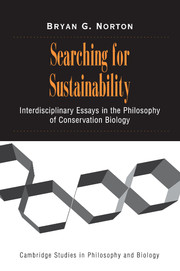Book contents
- Frontmatter
- Contents
- Searching for Sustainability
- General Introduction: An Interdisciplinary Experiment
- I PRAGMATISM AS AN ENVIRONMENTAL PHILOSOPHY
- II SCIENCE, POLICY, AND POLICY SCIENCE
- III ECONOMICS AND ENVIRONMENTAL SUSTAINABILITY
- IV SCALING SUSTAINABILITY: ECOLOGY AS IF HUMANS MATTERED
- V SOME ELEMENTS OF A PHILOSOPHY OF SUSTAINABLE LIVING
- 20 Caring for Nature: A Broader Look at Animal Stewardship
- 21 Can There Be a Universal Earth Ethic? A Reflection on Values for the Proposed Earth Charter
- 22 Intergenerational Equity and Sustainability
- VI VALUING SUSTAINABILITY: TOWARD A MORE COMPREHENSIVE APPROACH TO ENVIRONMENTAL EVALUATION
- Index
21 - Can There Be a Universal Earth Ethic? A Reflection on Values for the Proposed Earth Charter
Published online by Cambridge University Press: 21 January 2010
- Frontmatter
- Contents
- Searching for Sustainability
- General Introduction: An Interdisciplinary Experiment
- I PRAGMATISM AS AN ENVIRONMENTAL PHILOSOPHY
- II SCIENCE, POLICY, AND POLICY SCIENCE
- III ECONOMICS AND ENVIRONMENTAL SUSTAINABILITY
- IV SCALING SUSTAINABILITY: ECOLOGY AS IF HUMANS MATTERED
- V SOME ELEMENTS OF A PHILOSOPHY OF SUSTAINABLE LIVING
- 20 Caring for Nature: A Broader Look at Animal Stewardship
- 21 Can There Be a Universal Earth Ethic? A Reflection on Values for the Proposed Earth Charter
- 22 Intergenerational Equity and Sustainability
- VI VALUING SUSTAINABILITY: TOWARD A MORE COMPREHENSIVE APPROACH TO ENVIRONMENTAL EVALUATION
- Index
Summary
PART 1. VALUE THEORIES AND BIOLOGICAL DIVERSITY
Recent international discussions of biodiversity policy have established two points: (1) there is a strong and growing international consensus in favor of sustaining/protecting biodiversity, and (2) there is little agreement regarding why this should be done. Thus, while a significant international consensus regarding policy has apparently emerged, this consensus is not grounded in a consensually accepted value theory to explain why biodiversity protection, however strongly supported, should be a top priority of environmental policy. Lack of agreement on (2) has led to disagreements at the Earth Summit in Rio de Janeiro, for example, where delegates disagreed on whether to emphasize nature's economic, “utilitarian” value or its “intrinsic” value, defined as value that exists independently of human values and motives.
The ambivalence between saving nature for future use and saving nature for its own sake is written into the proposed principles for the new “Earth Charter,” which is being urged as a next step in developing a legal and political framework to guide local, regional, national, and international efforts to protect nature. Steven C. Rockefeller, an advocate of the Charter, writes: “In order to address the many interrelated social, economic, and ecological problems that face the world today, humanity must undergo a radical change in its attitudes, values, and behavior…. The purpose of the Earth Charter Project is to create a ‘soft law’ document that sets forth the fundamental principles of this emerging new ethics, principles that include respect for human rights, peace, economic equity, environmental protection, and sustainable living.”
- Type
- Chapter
- Information
- Searching for SustainabilityInterdisciplinary Essays in the Philosophy of Conservation Biology, pp. 396 - 419Publisher: Cambridge University PressPrint publication year: 2002



